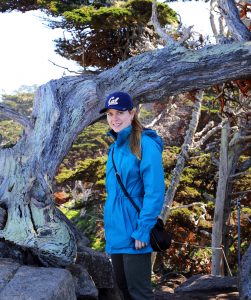Clarke Knight
View all Graduate Students
As of summer 2021, I obtained my PhD and graduated from the Battles Lab and UC Berkeley. I am currently a postdoctoral scholar at the U.S. Geological Survey where I am continuing to research paleoecological questions relevant to western North America. Please visit my Google Scholar page for an updated list of publications and my USGS staff profile for more information about current projects. You can still reach me at my Berkeley email: clarke.knight@berkeley.edu.
Summary of my dissertation research in the Battles Lab:
I am broadly interested in forest response to climate change, past and present. I work in California’s mixed conifer forests where disturbance regimes, especially wildfire, drive community composition and ecosystem function. Currently, I am focused on leveraging reconstruction techniques from paleo-ecology to compare modern forests to those from the late-Holocene and Euro-American settlement. My field sites are located in the Six Rivers National Forest, CA. My PhD research has been funded through a UC Berkeley Fellowship for Graduate Study, a Hellman Graduate Scholarship, the W.C. Rosencrans Fellowship for forest management research, and a Philomathia Graduate Fellowship in Environmental Science.
In 2019, I was awarded a CAL FIRE Forest Health Research Grant to study carbon storage in pre-suppression forests. This work directly ties to Senate Bill 901 that instructs CAL FIRE and the Air Resources Board to develop “a historic baseline of greenhouse gas emissions from California’s natural fire regime reflecting conditions before modern fire suppression.”
As of 2020, I joined the research team leading Project 1 at the Center for Ecosystem Climate Solutions, an initiative funded through California’s Strategic Growth Council under Gov. Gavin Newsom. We are developing tools to map ecosystem properties and services and lay the technical foundation for subsequent projects.
I am also convinced that scientific research should not remain abstract and unsullied by real-world problems, which has led to my interest in the application of science to recalcitrant environmental challenges. I was part of a team of scientists working on California’s 4th Climate Assessment. Published in 2018, this document is the largest collection of actionable climate change research in California’s history. I contributed to the regional chapter on Sierra Nevada.
Before starting a PhD at UC Berkeley in 2016, I received two masters degrees — an MSc in Water Policy and an MSc in Biodiversity Conservation — from the University of Oxford where I studied as a Rhodes Scholar, and a BA in Chemistry from Smith College.
Recent publications:
Knight CA, Anderson L, Bunting MJ, Champagne M, Crawford JN, Klimaszewski-Patterson A, Lake FK, Mensing SA, Potts MD, Wahl D, Wanket J, Watts-Tobin A, and JJ Battles. 2022. Land management explains major trends in forest biomass over the past millennia in California’s Klamath Mountains. Proceedings of the National Academy of Sciences 119(12): e2116264119. DOI: 10.1073/pnas.2116264119.
Knight CA, Tompkins RE, Wang JA, York R, Goulden ML, Battles JJ. 2022. Accurate tracking of forest activity key to multi-jurisdictional management goals: A case study in California. Journal of Environmental Management 302:114083.
Knight CA, Baskaran M, Bunting MJ, Champagne M, Potts MD, Wahl D, Wanket J, and Battles JJ. 2021. Linking modern pollen accumulation rates to biomass: Quantitative vegetation reconstruction in the western Klamath Mountains, NW California, USA. The Holocene. PDF. https://doi.org/10.1177/0959683620988038.
Knight CA, Cogbill CV, Potts MD, Wanket JA, and JJ Battles. 2020. Settlement-era forest structure and composition in the Klamath Mountains: Reconstructing a historical baseline. Ecosphere 11(9):e03250. PDF.
Knight CA, Blois J, Blonder B, Macias-Fauria M, Ordonez A, and Svenning J-C. 2020. Community assembly and climate mismatch in Late-Quaternary eastern North American pollen assemblages. The American Naturalist 195(2). PDF.
Lay summary at AmNat | Guest blog post
Knight CA. 2019. Policy belief change and learning in response to California flooding, In: Transitions in Flood Risk Management, Eds. Matilda Becker and Edmund Roswell, Oxford University Press.
Hughes, J, Knight CA, Bond H, and Stanley KM. 2019. Freshwater Ecology, In: Water Science: Global challenges and future directions. Eds Simon Dadson, Oxford University Press. PDF.
Dettinger M, Alpert H, Battles JJ, Kusel J, Safford H, Fougeres D, Knight CA, Miller L, and Sawyer S. 2018. Sierra Nevada Summary Report. California’s Fourth Climate Change Assessment. Publication number: SUM-CCCA4-2018-004. PDF.
Knight CA, Hughes JM, and Johns T. 2017. What drives non-native amphipod distributions in the River Thames? The role of habitat and human activity on species abundance. Crustaceana 90:4, 399-416. PDF.
